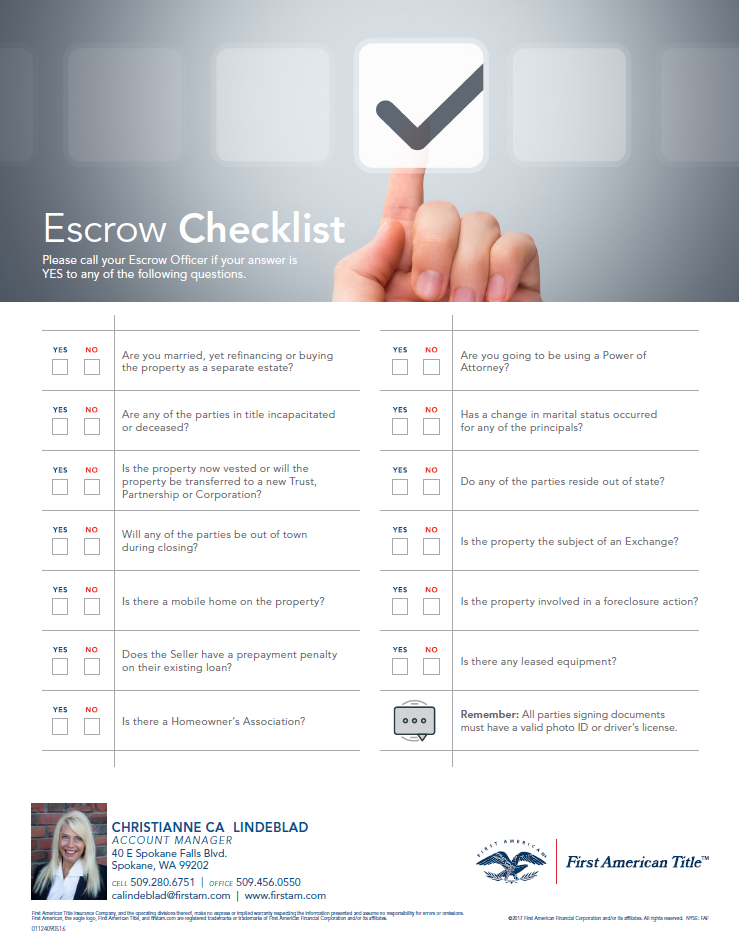Last updated on March 14th, 2023 at 07:50 pm
Your home just went under contract and the first thing your agent says is we will be opening title or escrow tomorrow. What does that mean? If you look at your contract you are going to notice that there is a contingency section on title. Specifically that you will be selling the buyer a home or property with a marketable and insurable title. What does marketable title mean? It basically means that there is nothing recorded against the property that would interfere with there use and enjoyment of the property. Or inhibit them from being able to sell the property in the future. You will note that you usually have X number of days to fulfill this contingency. So as usual with any Real Estate Contract time is of the essence.
So from there, the contract goes to the designated title company that was agreed upon in the contract. That title company is who you will be working with. They will pull from that contract anything that is recorded against your property.

That usually includes mortgage liens, easements, mechanic liens if they are out there IRS liens and anything else that shows up. They will also pull your name and info and pull up anything that is recorded against you and any other recorded owner of the property.
They will also pull your buyers’ information also any judgments, liens etc that would affect the mortgage company from writing them a loan. This is one of those moments that every skeleton gets shaken out of the closet.
Now before you panic or judge I also want to give you a disclaimer that this is also when false things that were placed on someone get shook out – so ask questions first because sometimes everyone gets a big surprise.
Also just fyi be prepared with notifying your list agent or buyers agent if you would check anything yes on this form! And just fyi I am not pushing one title company over another – this one just happened to provide a checklist that I thought was powerful in helping you the consumer. I am sure they all have one this one was just handy. Thank You Christianne!

My tidbit of wisdom here is if you have ever had judgments against you and you have paid them off Keep those receipts forever! There are some companies out there that a little push of a button can reactivate something that has been long gone dead. A little CYA never hurt anyone.
One thing you have to understand the title company will be selling title insurance to the buyer on this home. They will be guaranteeing the property to have a clear title so they will be pulling anything and everything that could possibly affect that property. And you really can’t get around this if your getting a mortgage as the mortgage company also wants yours and there interest protected.
So what happens if they pull some stuff up on the property that you didn’t know existed.
Let’s say they pull a mechanic lien for an outside paint job that you never did. You will have to contact the lien holder and negotiate a release of the lien. The title company will probably have a form that they will want that person to fill out and they will notarize it. Where it gets tricky is if you can’t find that person or there are other issues. Save receipts for work that was performed for the home. You never know when you have an unscrupulous person at the other end and unless you check your title regularly you will never know if someone put a lien on your home.
Some of the biggest problems I have seen over the years will be with divorced couples
Be it how they transfer to each other or who needs to sign what the issues are endless some days.
One major one years ago I had an elderly gentleman that was going to move in with his daughter. His ex-wife had gotten into some business trouble and had a rather large bill with the IRS. As part of there divorce decree they split the bill he paid half and his ex-had to pay half. Now at the time that they created that bill they were married so even though it had been part of the deal he paid off his half of the bill.
The ex-wife never paid hers and the IRS attached the bill to the house that was joint property at the time of the creation of the bill and when he went to sell the home he got the surprise of a lifetime. That house had about a $40k original lien against it plus penalties and interest. Of course, the ex-wife would not work with him to get the IRS to release the lien and Needless to say when it was all said and done he had to let the house go to foreclosure. The banks’ attorneys will eventually get that lien off title so they can sell the home but what a lot of unnecessary trouble.
If she would have cooperated I have seen the IRS release some liens so that homes can be sold. Yes, they will take the difference if there is some to apply to the bill but you can work with them. So if you’re approaching that situation that is one way it can go wrong.
Other major issues I have seen over the years have been child support judgments. If you are behind on child support and sell your home you can pretty much plan that the government will get your money. And that goes for your buyer to so if you see child support judgments come across for your buyer on the title commitment hopefully they are a mistake otherwise that will probably kill your deal. Hopefully, they did a pre-qual with a lender and already have or are dealing with them.
What else can go wrong over the pulling of the title?
Other things I have seen is buyers not liking where recorded easements are or worse easements that are not recorded.

This is where being very straight up property disclosure will help you. If they don’t learn about easements or encroachments until the pulling of the title they do have the opportunity to walk from the deal if they find out things that won’t work for them. So on that section in the Property Condition Report that you filled out when you listed your home you want to make sure that you are very specific on easements. Provide Documentation if possible. There is a section on the MLS for documents to go so there is no reason to not have your agent post that info if you have it.
Another thing that should be disclosed prior to the pulling of title is any impeeding LID’s that the city is going to be assessed on the property. Those will also usually show up.
Other things that can hold up Closing do to Title
Is everyone alive or around to buy or sell the property?
Property can be transferred by Power of Attorney (POA) but it must be a POA specific to Real Estate and sometimes specific to that transaction. The title office is going to need a copy of that as soon as possible to approve it and make sure they can use it. We do have military spouses buy all the time for there partner as we have adult children sell there parents property. But there are specific hoops you have to jump thru so be prepared and make sure that gets brought up right away so that if there is a problem it can be adjusted.
Is everyone a US Citizen?
Foreign Investment in Real Property Tax Act of 1980 has some hoops for you. Be sure to let everyone know so that the proper documentation can be prepared.
All Sellers have to fill out an IRS form reporting the sale of the home.
Is Everyone signing locally or are we having to Mail out or do a Remote Signing?
It is not usually an issue for the title company to sign someone that does not live locally. They call it a courtesy sign or the will send out a remote notary that will do the signing for them. It does take extra time so that is always something we want to let the title company and lenders know as soon as possible so that it does not hold up the closing day.
Valid Photo Identification
Everyone who has to sign for the sale or the purchase of Real Property needs to have a state issued Id card or a Current Passport (foreign passport must be stamped by US Immigration and Naturalization Services). The key word here is current! Always a good plan to check your driver’s license or ID and double check that it’s not in danger of expiring. If it is going to expire close to your closing date take care of it a month in advance. A renewal slip without your picture is not going to cut it.
What Comes Next? Read all about the Home Inspection.
Have a Home to Sell? Let my experience go to work for YOU! Let’s have a talk about your house!
"*" indicates required fields

